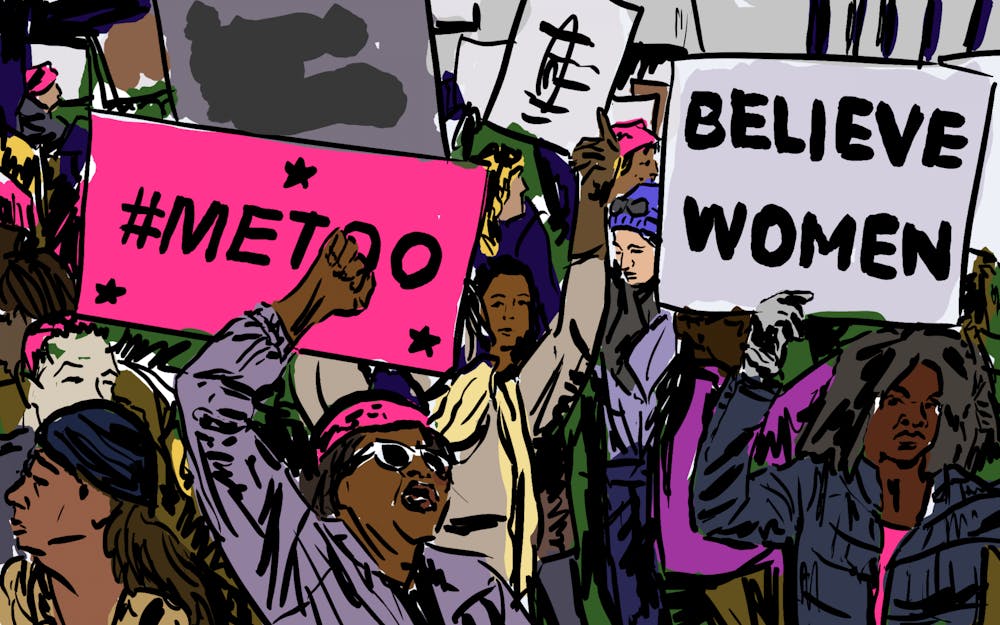Editor’s Note: This story includes mention of sexual violence. Resources are available here.
In recent years, assault victims are coming forward more frequently. When sharing their stories, it is common for those victims to experience additional abuse at the hands of the public, so this suspicion and distrust can silence them in the process.
It is time for that to stop.
In an excerpt of her new book of essays titled “Making a Scene,” actor Constance Wu talks about the time she was raped at the start of her career.
She lays out a situation where she was assaulted by an aspiring novelist named Ty on their second date.
“I felt a twinge of warning in my gut, but I ignored it—he didn’t look threatening or shady in any way, and if you had been there, you would have agreed,” Wu wrote in reference to being invited to his place.
When Wu asked Ty to stop forcing himself on her, he did not.
“Some people say that I should have fought back against Ty,” Wu wrote. “If I could go back in time, I wouldn’t change how I reacted that night. Because when I think about the girl I was back then, I understand what she was going through.”
Many will resonate with this feeling all too well. Most of the women in my life have a similar story to tell, and I have yet to meet a single woman who has not heard someone else’s story.
The hours I have spent reliving incidents where I could have been a different person — a stronger person — are countless. I should have told someone, or I should have run away screaming and crying. I should have done something.
Despite the girl I was, despite the red flags I ignored, despite the way my caution never grew, nothing would have stopped those men from crossing every boundary.
This is the most difficult truth to come to. Some people are just vile.
Wu also opened up about her experience on the ABC sitcom “Fresh Off the Boat” when a producer sexually harassed her. He demanded she wear short skirts, have long hair and send him selfies late at night.
“I also felt guilty because I felt like I was playing into it. I’ve got to pretend I’m part of the boys’ club,” Wu said in an interview on “Red Table Talk.”
As a teenager, I loved it when boys would call me “cool” or “different,” and I would force myself to shut down when my guy friends would ask personal questions about my body or the way I spent my free time. I was often the punchline in sexual jokes, and was made fun of if I had a negative reaction.
I remember one incident when I was slapped on my lower back by a close friend because I was “sitting like a slut.” Another time, a friend I trusted implicitly touched my thigh and asked me where I shaved.
I was sexualized for my ethnicity, my history, my sexual orientation, for things I did not even know could be sexualized. I felt useless without validation because my body was my only worth.
The worst part about it is, I’m not even sure those people remember doing this to me. I’m not sure they have ever thought twice about it, but I carry it with me wherever I go. It feels like a tattoo I never asked for, but everyone else can see.
Looking back, I do not feel shame for the girl I was then. I feel sympathy. She thought if she smiled through the harassment, assault and disgusting comments, if she laughed it off, men would start to respect her.
She thought maybe she would be viewed as a person. Maybe she would feel like a person.
“In a strange way I didn’t want to fight back and make a scene,” Wu wrote. “It was a quiet experience.”
Victims coming forward in unity can make these experiences less quiet. They can push for complete disruption of comfortability in the life of an abuser. The years have taught me to be vocal about what happened to me, to recognize that I am not at fault and I did not deserve any of it.
I only hope people continue to share their stories and are met with solidarity and love for themselves. It is what every victim deserves.




